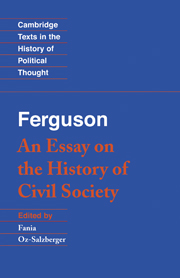Introduction
Published online by Cambridge University Press: 05 June 2012
Summary
Adam Ferguson was bora in 1723 in the village of Logierait, Perthshire, on the border between the Scottish lowlands and highlands. His father was a Presbyterian minister, his mother a distant relation of the dukes of Argyll. The young Adam excelled in Greek and Latin and became an avid reader of the ancient authors. Like other contributors to the Scottish Enlightenment, his thought was shaped by his Presbyterian background and classical education; but what made him an unusual Enlightenment thinker was his acquaintance with the Gaelic-speaking society of the highlands. The first-hand and early encounter with both ‘raw’ clansmen and ‘polished’, anglicized lowlanders was a formative experience in his life.
At the age of sixteen Ferguson went to the University of St Andrews. After taking his MA degree in 1742 he began preparing himself for the ministry and moved to the University of Edinburgh. There he joined a circle of young divinity students who were similarly on their way to becoming clergymen, scholars and men of letters. Among them were the future preacher and professor, Hugh Blair, the future playwright, John Home, and the future historian and principal of the University of Edinburgh, William Robertson. These men were to become part of the Edinburgh kernel of the Scottish Enlightenment.
Edinburgh in the early 1740s was a place of tension between rival political powers and competing ideas of national identity.
- Type
- Chapter
- Information
- Ferguson: An Essay on the History of Civil Society , pp. vii - xxvPublisher: Cambridge University PressPrint publication year: 1996

